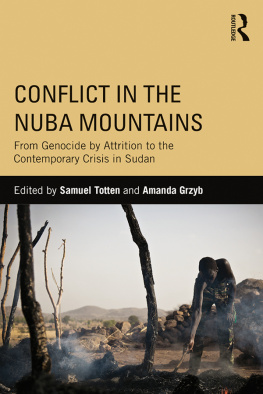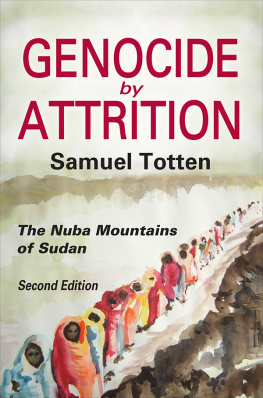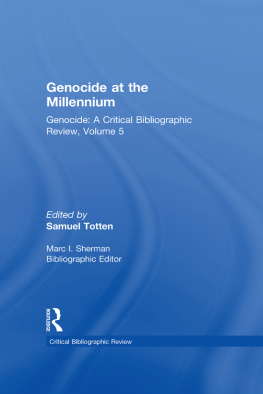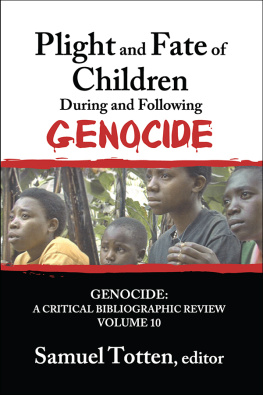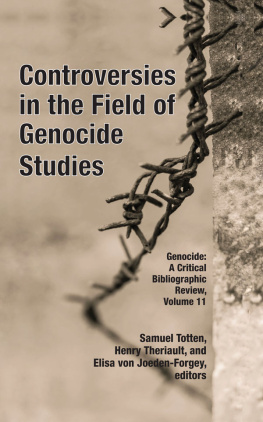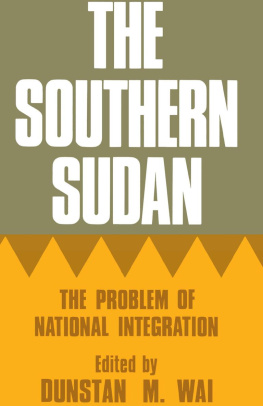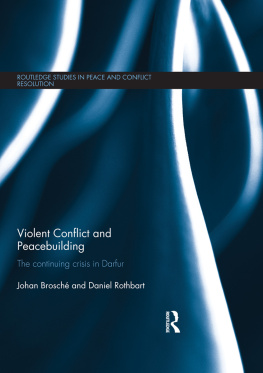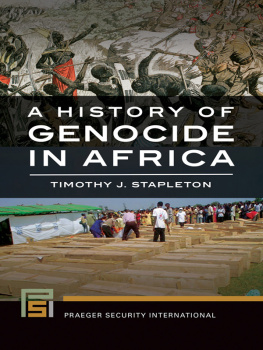Conflict in the Nuba Mountains
This book provides a comprehensive overview of the embattled Nuba Mountains of South Kordofan, where the government of Sudan committed genocide by attrition in the early 1990s and where violent conflict reignited again in 2011. A range of contributorsscholars, journalists, and activiststrace the genesis of the crisis from colonial era neglect to institutionalized insecurity, emphasizing the failure of the 2005 Comprehensive Peace Agreement to address the political and social concerns of the Nuba people. This volume is essential reading for anyone who wants to understand the nuances of the contemporary crisis in the Nuba Mountains and explore its potential solutions.
Samuel Totten is a scholar of genocide studies at the University of Arkansas, Fayetteville. He is the author and editor of multiple books about genocide, including Genocide by Attrition: The Nuba Mountains, Sudan and Centuries of Genocide: Critical Essays and Eyewitness Accounts.
Amanda F. Grzyb is associate professor of information and media studies at Western University (Canada), where her teaching and research focuses on Holocaust and genocide studies, social movements, homelessness, and media and the public interest.
First published 2015
by Routledge
711 Third Avenue, New York, NY 10017
and by Routledge
2 Park Square, Milton Park, Abingdon, Oxon, OX14 4RN
Routledge is an imprint of the Taylor & Francis Group, an informa business
Taylor and Francis 2015, except chapters 6 and 12 Samuel Totten 2015
The right of Samuel Totten and Amanda F. Grzyb to be identified as the authors of the editorial material, and of the authors for their individual chapters, has been asserted in accordance with sections 77 and 78 of the Copyright, Designs and Patents Act 1988.
All rights reserved. No part of this book may be reprinted or reproduced or utilized in any form or by any electronic, mechanical, or other means, now known or hereafter invented, including photocopying and recording, or in any information storage or retrieval system, without permission in writing from the publishers.
Trademark notice: Product or corporate names may be trademarks or registered trademarks, and are used only for identification and explanation without intent to infringe.
Library of Congress Cataloging-in-Publication Data
Conflict in the Nuba Mountains : from genocide by attrition to the
contemporary crisis / edited by Samuel Totten and Amanda F. Grzyb.
pages cm
Includes bibliographical references and index.
1. Nuba (African people)Crimes againstSudanNuba Mountains
Region. 2. Nuba Mountains Region (Sudan)Politics and government.
3. SudanPolitics and government1985 4. SudanEthnic relations
Political aspects. I. Totten, Samuel, editor of compilation. II. Grzyb,
Amanda F., 1970 editor of compilation.
DT155.2.N82C66 2014
962.8043dc23
2014022487
ISBN: 978-0-415-84375-1 (hbk)
ISBN: 978-0-415-84376-8 (pbk)
ISBN: 978-0-203-75587-7 (ebk)
Typeset in Bembo
by Apex CoVantage, LLC
Samuel Totten dedicates this book to all of the civilians in the Nuba Mountains who simply want to live in peace and enjoy their basic human rights, and to his wife, Kathleen Marie Barta, for her steadfast love and incredible support as he periodically ventures into the Nuba Mountains.
Amanda Grzyb dedicates this book to her beloved daughters, Charlotte and Lucy, with the hope that they will come of age in a more peaceful, just, and equitable world.
Contents
Samuel Totten and Amanda F. Grzyb
Guma Kunda Komey
Mudawi Ibrahim Adam
Gillian Lusk
Alex de Waal
J. Millard Burr (December 1998)
Samuel Totten
Jok Madut Jok
John Young
Siddig T. Kafi
Wendy James
Rebecca Tinsley
Conducted by Samuel Totten
We wish to sincerely thank J. Millard Burr for allowing us to reprint his landmark report, Quantifying Genocide in Southern Sudan Nuba the Mountains, 1983 1998, in our book. Likewise, we sincerely thank Alex de Waal for permitting us to reprint his chapter, Genocide by Attrition, which appeared in Centuries of Genocide: Critical Essays and Eyewitness Accounts , in our book.
Thanks are also due to Michael Kerns at Routledge for his keen interest in this project and his ongoing support.
Finally, Amanda Grzyb wishes to acknowledge the excellent work of her research assistant, Jennifer Schmidt, who assisted in the final stages of formatting the manuscript.
The boundaries and names shown and the designations used on this map do not imply official endorsement or acceptance by the United Nations.
* Final boundary between the Republic of Sudan and the Republic of South Sudan has not yet been determined.
** Final status of the Abyei area is not yet determined.

Source : Rift Valley Institute, 2012.
Samuel Totten and Amanda F. Grzyb
As this book goes to publication, political strife and violence continue in Sudan, particularly in the regions of South Kordofan, Blue Nile, and Darfur. Unlike the sustained international attention focused on the crisis in Darfur from 2003 to 2009, these contemporary conflicts have received relatively little attention from the international community, individual governments, corporate news media, activists, or the general public. The latter is a major reason why we, the editors, felt compelled to develop this book.
Conflict in the Nuba Mountains: From Genocide by Attrition to the Contemporary Crisis in Sudan provides a comprehensive overview of one of these embattled regions, the Nuba Mountains of South Kordofan, whereaccording to many scholars and observersthe Government of Sudan (GoS) committed genocide by attrition in the early 1990s, and where violent conflict reignited again in 2011. Our contributors explore the nuances of these two related crises from a variety of perspectives, providing detailed and sometimes divergent analyses about the causes and implications of renewed insecurity in the region.
The crises in the Nuba Mountains, as with other marginalized areas of Sudan, are rooted in a long legacy of precolonial, colonial, and postcolonial neglect, political exclusion, institutionalized insecurity, and a lack of adequate and/or equitable development. Over the centuries, the Nuba people have endured slavery, war, artificial famine, genocide by attrition, and ethnic cleansing, among other major human rights violations and atrocities. Since its independence in 1956, Sudan has suffered decades of violent conflict, including two long civil wars: the First Sudanese Civil War from 1955 to 1972, and the Second Sudanese Civil War from 1983 to 2005. The latter resulted in approximately two million dead, and precipitated atrocities in the Nuba Mountains in the late 1980s to early to mid-1990s; the killings and massive displacement in Darfur between 2003 and today, which some have deemed genocide; and contemporary fighting between the Sudan Peoples Liberation Movement-North (SPLM-N) and the GoS in South Kordofan and Blue Nile between June 2011 and today.

